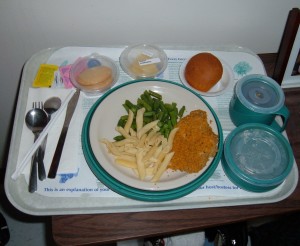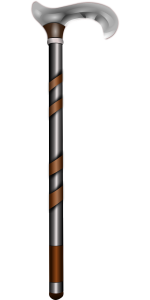May 13th, 2016
“Be Careful. He’s Violent.”
Briana Buckner, MD

Briana Buckner, MD, is a 2015-16 Chief Resident in Internal Medicine at the University of Pennsylvania in Philadelphia.
“Be careful. He’s violent.” That was the way sign out began for Mr. T. The intern continued, “He has been in the hospital forever because he was kicked out of his nursing home. Good luck. And, oh yeah… he’s blind.” Puzzled, I looked at my list of patients and, not sure whether I should write “violent” by this patient’s name, I decided instead to write “blind.” I paused. The intern said, “Don’t worry, he hit someone with his cane. When you enter his room, just keep your eye on the cane.”
The next morning, as I approached the room, I was nervous and unsure of what to expect. When I knocked on the door I was greeted sharply with a bit of a grunt and a quick “Is that my breakfast tray?” I quickly responded ‘no’ and that I was the new doctor on the team. Knowing that a hungry patient can be tricky to warm up, I decided to sit down first. I found a very tall African American man sitting near the window, listening to the radio. Mr. T appeared much older than his stated age, and he wore a spirit of fatigue that was heavy and ominous. I could also sense his strong feelings of distrust, which I often see in African American patients, but his inability to see his surroundings presented an even higher barrier for me to climb.
During my first two days of taking care of Mr. T, I didn’t examine him. I just sat there with him. Shamefully telling my attending on both days that the patient was on his way to dialysis when asked why I was unable to examine him. I knew he felt violated and distrustful, so I wanted to wait for him to trust me. First, I started with asking about the music he enjoyed, since he was always listening to the radio. Through his love of music, I begin to learn about his life. I found out that he grew up in the foster care system, that he had been homeless for a year, and that, at the young age of 40, he lost his vision due to diabetes.
 While getting to know Mr. T, I also began to learn the dynamics of the unit. Mr. T had been labeled as violent and there was no turning back. The nurses didn’t take to Mr. T, and he didn’t like the nurses. The doctors stayed away from his room and only entered with a quick hello in the early morning during rounds. The most striking thing I observed was how people would talk about Mr. T very loudly near his room and as he walked the halls, as if he were both deaf and blind. The nursing assistants would say loudly, “I had Mr. T yesterday, I want a different patient today.” The phlebotomists would ask the nurse next to his open door, “Is this the blind man? Do you think he will let me get his blood today?” I often would get a frantic call to Mr. T’s room to find him in a yelling match with a team member about his food tray and why his breakfast never came before dialysis. At first, I didn’t understand: This was not the gentle Mr. T that I knew from our afternoon chats. But then, I realized that it was.
While getting to know Mr. T, I also began to learn the dynamics of the unit. Mr. T had been labeled as violent and there was no turning back. The nurses didn’t take to Mr. T, and he didn’t like the nurses. The doctors stayed away from his room and only entered with a quick hello in the early morning during rounds. The most striking thing I observed was how people would talk about Mr. T very loudly near his room and as he walked the halls, as if he were both deaf and blind. The nursing assistants would say loudly, “I had Mr. T yesterday, I want a different patient today.” The phlebotomists would ask the nurse next to his open door, “Is this the blind man? Do you think he will let me get his blood today?” I often would get a frantic call to Mr. T’s room to find him in a yelling match with a team member about his food tray and why his breakfast never came before dialysis. At first, I didn’t understand: This was not the gentle Mr. T that I knew from our afternoon chats. But then, I realized that it was.
I realized that Mr. T’s greatest problem was that he didn’t feel in control. He could not see, he was in unfamiliar surroundings, and his housing security had disappeared abruptly. One day, after I was able to calm him down from yet another shouting match with food services, I finally asked him, “Mr. T, why are you so angry today?” He said to me, “I hear how y’all talk about me around here. These people come in my room with an attitude and an opinion of me before they even meet me. And y’all wonder why I’m so angry. I just want to be able to get my breakfast before I go to dialysis. I come back 4 hours later, hungry and tired. Don’t you get your food when you want it?”
I had no response to make. Although I did not know all of the background about what had caused his displacement, I knew we were failing him. Failing him as a team, as a unit, and as a healthcare system. I also questioned how we formed our opinion of him in the unit. Were most of our opinions and feelings toward him formed before we even met him? Did we let our professionalism level slip as a medical unit because of our biased opinions? Isn’t true professionalism defined by our insignificant daily activities? We were anchored into our opinion of him as violent, similar to how to a doctor can be anchored in a diagnosis of pneumonia. When presented with new information on Mr. T, were we able to reassess our position towards him?
 With time, Mr. T begin to mellow out and became less angry about his breakfast. Less because he trusted the staff and more as a sign of defeat because the prospect of him finding a long-term home became dimmer. His fear, which initially was displayed as anger, transitioned more into withdrawal and quiet spirit. Despite this change in spirit, the unit continued to label him as “angry” and, each shift, the nurses and doctors would sign out, “He’s violent. Watch his cane.” Without any mention of his distrust, loss of control, and the effects that his vision impairment had on his interactions with the staff.
With time, Mr. T begin to mellow out and became less angry about his breakfast. Less because he trusted the staff and more as a sign of defeat because the prospect of him finding a long-term home became dimmer. His fear, which initially was displayed as anger, transitioned more into withdrawal and quiet spirit. Despite this change in spirit, the unit continued to label him as “angry” and, each shift, the nurses and doctors would sign out, “He’s violent. Watch his cane.” Without any mention of his distrust, loss of control, and the effects that his vision impairment had on his interactions with the staff.
Finally, a nurse came up to me and said, “I don’t know how you deal with Mr. T. He seems to only like you.” Frustrated with the stigma surrounding my patient, I wanted to ask everyone on the unit, “Why have we let our professionalism suffer when faced with the demands of a difficult patient?” But I was too exhausted and weathered from the dynamics of the situation. I simply answered, “I’m not sure either.”


Good article
That just breaks my heart but I know it is far more common than we want to admit. So many factors contribute to how we view and treat others but the bottom line is always from our perspective, not theirs. And then you look back years later and wonder if the system (his own parents, early healthcare and patient education regarding his diabetes, etc.) hadn’t failed him, how differently might he be seen?
I applaud the young clinician for her ability to see the human spirit inside this angry man.
I wish I could say that I would have reacted the same way 55 years ago when I graduated medical school; but, I doubt it.
Now, as part of the aging cadre of retired physicians, I can see wisdom and feeling at work. Bless her.
Our young physician has discovered the magic of offering a semblance of control to our patients who landed in an out of control (to them) situation. As one frequently faced with doing invasive procedures after others have failed, offering input opportunities from the patient as simple as laterality choices or site selection (with pluses and minuses of each) really help. Kudos for listening. Taking the time can save time in the long run.
Mr. T (aptly named after someone renowned for a more optimistic mixture of power, presence and control) is a challenging patient. His invalidators are “violent” and “blind” (interestingly parodies of his physical strength and agility with the cane and acute hearing!!). Sometime it takes a whole hospital to heal a patient . ..
1. His attending (Dr.B) needs permission to be assigned exclusively as his “health care navigator/advocate/agent”. If your bosses don’t get it – show them this note – or simply demand it. It’s going to be helpful and net cost effective.
2. Mr. T needs to get on with his rehab and off being professionally offended.
3. His legitimate complaints should be objectively responded to – including apologies from insensitive disrespectful staff. Get him a breakfast before dialysis (if this is medically permissible).
4. Mr. T’s medical challenges need to be advanced ASAP – placement, planning, visual loss adaptation, diabetes education, etc etc.
5. Dr. B’s mentor needs to secure that this experience is enlivening invigorating and inspiring for Dr. B – not depleting, despairing or degenerative adding towards the burnout seen in younger and younger physicians – particularly the higher performing ones (IMHO).
In the end she should have confronted the staff and her attending as to why no one took the time to understand him. In a sense, she kind of failed that patient, and every patient that followed on that unit.
I am in no way saying she was wrong in her approach, but she passed on a very valuable teaching opportunity… And isn’t that what we, as medical professionals do? Teach?
Excellent and thank you for writing in advocacy of the most vulnerable (often one-time or currently homeless) patients. On the closing point, however, it would be wonderful to see physicians saying to their attendings, peers, subordinates, or superiors, “I did not perform a physical exam because I need time to build his trust and a therapeutic relationship,” instead of fibbing, further inculcating the culture of avoidance that surrounds these patients. Thank you for putting this into words and may we all find our outer voices of on-the-spot advocacy and push back against the cultural norms that fail so many.
Problem is not with the patient
as different care providers feel differently about the same person.
-Sister shivani
As an older medical student, and member of a social minority myself, I see this too. Sadly hospitals run on routines and expectations, which are designed for the average person. The problem of course is that the average person doesnt exist. So while most people will find minor irritations with the “system,” anyone with a disability, or any member of a social minority is starting on an uphill slope already. The “rules” often dont fit their needs at all, and yet its not always obvious to those not from the same background why what seems reasonable to them, is so utterly unreasonable to the patient.
I think the answer lies in trying to imagine the life circumstances of the patient. Instead of assuming they are being wilfully difficult try to see the world through their eyes, and use that fabled quality of a good clinician EMPATHY.
Kudos to this young doctor in training. Yes, the team failed this pt, but mostly the nurses failed this pt. Nursing interventions include providing all pts a locus of control, whether through food choices (those permitted), HS routine choices, even where to place the call light. A first year nursing student should know this. A call to the kitchen might have gone quite far to improve relations between Mr T and the staff. The RN on the floor should have taken that CNA aside to remind her/him that we do not make such comments within earshot of pts or family. I do strongly feel that we should grant ourselves permission to be open about our feelings regarding “difficult” pts–but in private and only amongst other team members. We need to vent when we ourselves feel out of control, and that is what was happening with Mr T. Our business as usual (or is that busy-ness as usual?) wasn’t working for him. Staff became frustrated and failed to support this pt. All we can do is learn from Mr T and try as much as we can to support one another as team members, but especially model nurturing/mentoring behavior to the students and new practitioners among us. That is how culture is changed over time. And perhaps the next isolated, disabled, angry pt will not be treated the way Mr T was. I hope so.
Thank you for your comments. Some patients you never forget and for me he was definitely one I will carry with me for the remainder of my career.
You have a wonderful sense in identifying the loss of autonomy! Even at our best, we are so obsessed with our beneficence and our selfish need to do good that we continue to fail our patients autonomy. Anesthesiology, my specialty, is practically based on taking away that precious pillar from from a patient and it is unbelievable of often we forget that before, and after, the person requires validation as an individual…
Beautiful reminder. Thank you
Excellent and thank you for writing in advocacy of the most vulnerable (often one-time or currently homeless) patients. This article brings out the core character of a docor – empathy.
Instead these days because of too many red tapes and administrative duties surrounding a patient, this virtue seems to have been thrown out of the window.